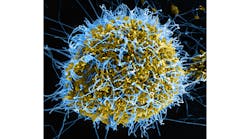Second Health Care Worker Tests Positive for Ebola; CDC Wants to Interview Airline Passengers
A second nurse at Texas Presbyterian Hospital has tested positive for Ebola, according to preliminary tests performed Tuesday night by the Texas Department of State Health Services’ laboratory.
In a scary twist, CDC confirmed that the nurse, Amber Joy Vinson, traveled on a Frontier Airlines flight from Cleveland to Dallas on Monday – a day before she reported symptoms of Ebola. Vinson reportedly was visiting family in Akron from Oct. 8 to Oct. 13.
CDC is asking all passengers who were on Frontier Airlines Flight 1143 – which landed at 8:16 Central time Monday in Dallas – to contact the agency. Public health professionals are interviewing passengers about the flight, answering their questions and arranging follow-up interviews.
CDC said it will “actively” monitor any passengers who seem to be at risk of contracting the virus.
In a statement, Frontier Airlines said Dallas/Fort Worth was the last stop for Flight 1143 on Monday, and the airplane “received a thorough cleaning per our normal procedures, which is consistent with CDC guidelines, prior to returning to service the next day.” The airplane also was cleaned in Cleveland on Tuesday, the airline said.
The health care worker “exhibited no symptoms or sign of illness while on Flight 1143, according to the crew,” Frontier Airlines said.
During a conference call, CDC Director Tom Frieden said that both nurses who have tested positive for Ebola after caring for Thomas Eric Duncan at Texas Presbyterian Hospital were exposed to Duncan's bodily fluids before he was diagnosed with Ebola.
Ebola Experts Headed to Dallas
On Tuesday, CDC said it was sending an additional team to Dallas. The team was to include “experts who successfully controlled outbreaks of Ebola in Africa in the past two decades.”
“Team members have worked with Doctors Without Borders on infection-control protocols and trained others in Africa to follow those protocols,” CDC said. “This expertise is being directly shared with the hospital.”
Two infection-control nurses from Emory University Hospital in Atlanta are joining the response effort in Dallas as well. The nurses, “who have experience treating Ebola patients without infecting health care workers,” will provide “peer-to-peer training and support,” according to CDC.
CDC said it is taking additional steps to respond to the Ebola outbreak, including:
- Making “immediate and specific improvements to processes and procedures” at Texas Presbyterian Hospital to reduce risk to health care personnel. “Care for a patient with Ebola requires meticulous attention to detail, and refining these steps makes it safer and easier,” CDC said.
- Stationing a site manager at Texas Presbyterian Hospital to oversee the donning and doffing of PPE and the care given in the isolation unit.
- Establishing a dedicated CDC response team that could be on the ground within a few hours at any hospital that has a confirmed Ebola patient. The response team “would provide in-person, expert support and training on infection control, health care safety, medical treatment, contact tracing, waste and decontamination, public education and other issues.”
- Providing more opportunities for U.S. health care providers to receive additional training and to get their questions answered from CDC experts.
“While this is troubling news for the patient, the patient’s family and colleagues and the greater Dallas community, the CDC and the Texas Department of State Health Services remain confident that wider spread in the community can be prevented with proper public health measures including ongoing contact tracing, health monitoring among those known to have been in contact with the index patient and immediate isolations if symptoms develop,” CDC said.
Ebola is spread through direct contact with bodily fluids of a sick person or exposure to objects such as needles that have been contaminated. The illness has an average incubation period of eight to 10 days (although it could be from two to 21 days), so CDC recommends monitoring exposed people for symptoms over the full 21-day period. People are not contagious during the incubation period, meaning before symptoms such as fever develop.
